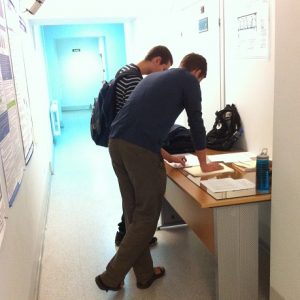At the end of April, Andrea Sims taught a one-week intensive Ph.D. course in Inflectional Morphology at Ghent University (Ghent, Belgium). The course focused on the formalist inferential-realizational approach to inflectional theory (its general motivation and theory-specific mechanisms), and comparison of different theoretical analyses of inflectional data.
a one-week intensive Ph.D. course in Inflectional Morphology at Ghent University (Ghent, Belgium). The course focused on the formalist inferential-realizational approach to inflectional theory (its general motivation and theory-specific mechanisms), and comparison of different theoretical analyses of inflectional data.
Equivalent to about half of a semester-long Ph.D. seminar — but in only one week — the course was certainly challenging for students (and Andrea!). But they really worked hard to deepen their understanding of inflectional theory and made great strides.
The course was arranged by Cindy Johnson, an OSU alum (Ph.D. in Linguistics, 2014). A big thanks to Cindy for the invitation to Ghent, and to all of the students who gamely took the inflectional tour of Albanian, Georgian, Russian (including the analysis sketched on the whiteboard at left), Sahaptin, Swahili, and many other languages.




